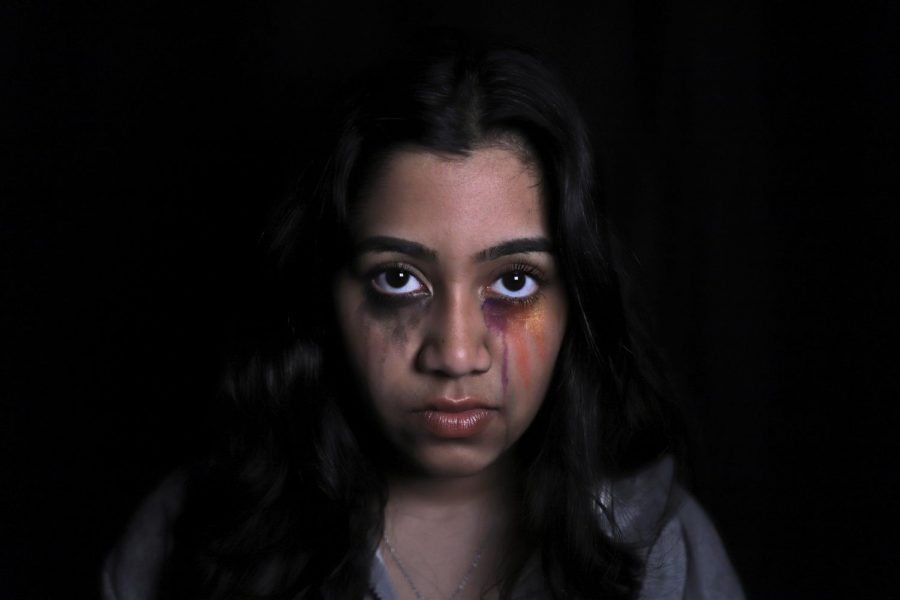The Skin We’re In
How social media influences body image and personal health.
March 5, 2020
Whether we’d like to admit it or not, social media is shaping our concept of beauty. We are constantly consuming images posted online, and images online are constantly consuming us. Social media influences how we look at ourselves both positively and negatively, and in understanding its effects, we can limit the negative impact it has on our mental health.
How Social Media Helps Body Image
Despite social media’s negative connotation with body image, it isn’t all bad.
Facebook, Instagram, and Twitter all offer support groups for people who aren’t happy with the way they look, the two biggest ones being the Body Image Movement and the National Eating Disorder Association.
Similarly, Sarah Gervais, Ph.D. of Psychology Today, found that Instagram can make eating disorder-specific keywords or hashtags unsearchable, blocking users from viewing potentially triggering images. When excluded, people can focus on healthier representations of bodies on social media and be reminded that the proper way to view their body isn’t through altering it to fit the look.
How Social Media Hurts Body Image
Think of social media as a highlight reel.
That pose that made your body look best.
That smile that made you look happiest.
That filter that made your skin look clearer.
Our Instagram feeds give us the tools to put the best versions of ourselves on display. And while it may get us hundreds of likes, it can distort the way we view the world when the camera turns off and the filters go away.
The biggest problem with social media is it makes us compare our lives and our bodies to altered and edited ones. Social media has been proven to be a factor in developing eating disorders such as anorexia and bulimia nervosa, often tricking young men and women into believing their bodies don’t make the mark because they don’t look like what we see on the feed.
On top of that, attempting to imitate “perfect” influencers and celebrities can lead to dissatisfaction with oneself. This can cause a person to feel bad about how lackluster their normal life seems in comparison to the extravagant ones they see online—because it feels like there will always be someone who looks happier and healthier.
Preventing Body Image Issues
Researchers have offered tips on how to maintain a positive body image in the world of social media.
Sophie Medlin, a contributor to Forbes, offered tips for how social media users can maintain a positive outlook on their body image:
- Looking at how body-positive influencers treat body image
- Avoiding negatively speaking about your body
- Disconnecting from social media from time to time to be active instead
We need more research on what preventative measures and treatments are effective to combat this 21st century problem. Scholars and psychologists haven’t pinpointed the best practices for screening and treating mental health problems associated with social media, but solutions like those above can weaken the blow for now.
Advertising
Unfortunately, it’s not just social media that causes people to be self-conscious of their bodies; advertising contributes as well. And while you can choose to just delete Snapchat and Instagram from your phone, the challenge consumers face with advertising is that it’s inescapable.
In between breaks from your favorite Television show.
Almost every page of your favorite magazines.
Commercial breaks on the radio and right before movies in the theaters.
These are just a few of the places advertising utilizes to be just as powerful as social media when it comes to impacting a person’s self-esteem and body image.
Although advertising aims to convince us to buy things, they seldom portray people that look like the typical person. The average female fashion model wears a size 2 or 4, miles from the national average size of 12 to 14. Clothing designers often defend this choice, saying they only use very thin models because the clothes “look better” on them. In addition, the photos of models in print ads don’t show the hours spent editing out every flaw and imperfection of the human body.
This is why it’s important to remember, the next time you see a perfect model with perfect skin and perfect teeth with a perfect smile: this is not real life. Flaws are okay. Different is okay. You are okay.
Statistics on Body Image
- Approximately 91% of women are unhappy with their bodies and resort to dieting to achieve their ideal body shape. Only 5% of women naturally possess the body type often portrayed by Americans in the media.
- More than 40% of women and about 20% of men agreed they would consider cosmetic surgery in the future.
- 95% of people with eating disorders are between the ages of 12 and 25.
- Only 10% of people suffering from an eating disorder will seek professional help.



